Related Research Articles
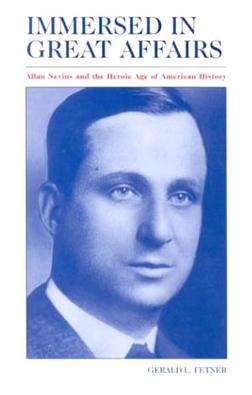
Joseph Allan Nevins was an American historian and journalist, known for his extensive work on the history of the Civil War and his biographies of such figures as Grover Cleveland, Hamilton Fish, Henry Ford, and John D. Rockefeller, as well as his public service. He was a leading exponent of business history and oral history.
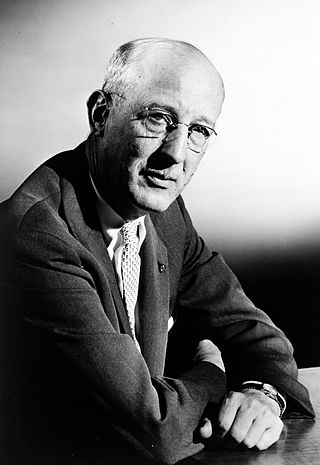
Charles Bruce Catton was an American historian and journalist, known best for his books concerning the American Civil War. Known as a narrative historian, Catton specialized in popular history, featuring interesting characters and historical vignettes, in addition to the basic facts, dates, and analyses. His books were researched well and included footnotes. He won the Pulitzer Prize for History and the National Book Award for Nonfiction in 1954 for his book A Stillness at Appomattox (1953), a study of the final campaign of the war in Virginia and third book in his Army of the Potomac trilogy.
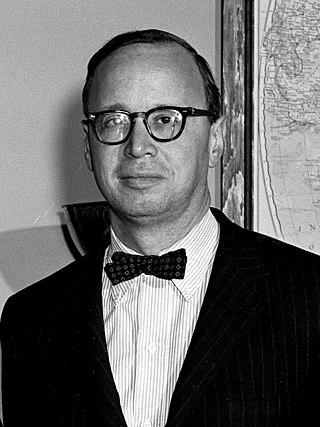
Arthur Meier Schlesinger Jr. was an American historian, social critic, and public intellectual. The son of the influential historian Arthur M. Schlesinger Sr. and a specialist in American history, much of Schlesinger's work explored the history of 20th-century American liberalism. In particular, his work focused on leaders such as Harry S. Truman, Franklin D. Roosevelt, John F. Kennedy, and Robert F. Kennedy. In the 1952 and 1956 presidential campaigns, he was a primary speechwriter and adviser to the Democratic presidential nominee, Adlai Stevenson II. Schlesinger served as special assistant and "court historian" to President Kennedy from 1961 to 1963. He wrote a detailed account of the Kennedy administration, from the 1960 presidential campaign to the president's state funeral, titled A Thousand Days: John F. Kennedy in the White House, which won the 1966 Pulitzer Prize for Biography or Autobiography.
Horace North Callahan was an American journalist, historian and scholar.
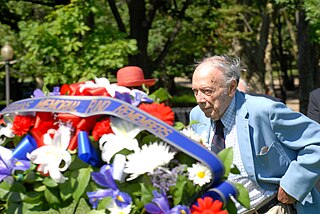
Stanley Abram Karnow was an American journalist and historian. He is best known for his writings on East Asia and the Vietnam War.

The Oxford History of the United States is an ongoing multivolume narrative history of the United States published by Oxford University Press. Conceived in the 1950s and launched in 1961 under the co-editorship of historians Richard Hofstadter and C. Vann Woodward, the series has been edited by David M. Kennedy since 1999.
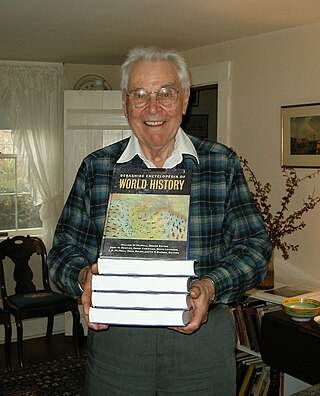
William Hardy McNeill was an American historian and author, noted for his argument that contact and exchange among civilizations is what drives human history forward, first postulated in The Rise of the West (1963). He was the Robert A. Millikan Distinguished Service Professor Emeritus of History at the University of Chicago, where he taught from 1947 until his retirement in 1987.
Benjamin Arthur Quarles was an American historian, administrator, educator, and writer, whose scholarship centered on black American social and political history. Major books by Quarles include The Negro in the Civil War (1953), The Negro in the American Revolution (1961), Lincoln and the Negro (1962), and Black Abolitionists (1969). He demonstrated that blacks were active participants in major conflicts and issues of American history. His books were narrative accounts of critical wartime periods that focused on how blacks interacted with their white allies and emphasized blacks' acting as vital agents of change rather than receiving favors from whites.

James Irvin "Bud" Robertson Jr. was an American historian on the American Civil War and professor at Virginia Tech.
The East Tennessee Historical Society (ETHS), headquartered in Knoxville, Tennessee, United States, is a non-profit organization dedicated to the study of East Tennessee history, the preservation of historically significant artifacts, and educating the citizens of Tennessee. The society operates a museum and museum shop in the East Tennessee History Center on Gay Street in downtown Knoxville. The East Tennessee Historical Society was established in 1834, 38 years after the establishment of the state of Tennessee, to record the history of the development and settlement of the area.
Bell Irvin Wiley was an American historian who specialized in the American Civil War and was an authority on military history and the social history of common people. He died in Atlanta, Georgia, from a heart attack.
John David Winters was an American historian at Louisiana Tech University in Ruston, Louisiana. He is known for his monograph The Civil War in Louisiana, which was published in 1963, released in paperback in 1991, and is still in print. When published, it was the first and only single volume history covering events in Louisiana from 1861 to 1865.

The Mississippi Historical Society (MHS) is a historical society located in the U.S. state of Mississippi. The society was established in 1858 but was terminated soon after because of the outbreak of the American Civil War. It remained in hiatus until 1890, after which it published extensively over the next 35 years and helped establish the Mississippi Department of Archives and History in 1902. After a second protracted hiatus from 1925 until 1952, the society re-emerged and has remained in continuous operation ever since.
Kenneth C. Martis is an American political geographer notable for his mapping and documentation of the electoral history of the United States. He is a Professor Emeritus in the Department of Geology and Geography at West Virginia University.

James Kendall Hosmer was an American (Union) soldier during the American Civil War, a pastor, library director, historian, author and a professor of history and literature. Members of the Hosmer family fought in the French and Indian War, American Revolution and the Civil War. As a pastor of the First Church in Deerfield, Massachusetts he left the ministry, feeling duty bound to join the U.S. Army to serve in the Civil War, insisting to serve at the front, where he participated in several major campaigns. As an author and historian he later wrote and published several works about and involving the Civil War and how he viewed the cause of both the North and South. He also authored a number of other works relating to early American history, along with several novels and a fair number of poems. Hosmer also reviewed and published accounts about the Lewis and Clark Expedition at a time when full accounts of the expedition were very few in number and out of print. During his career he corresponded with many prominent writers and historians involving his works. In his latter life he held several prominent positions in various literary associations, including his position as president of the American Library Association.

David R. Goldfield is an American historian, writer, film director, and professor. He is a long-time supporter of the Democratic Party. He is the author of sixteen books, including Black, White, and Southern: Race Relations and Southern Culture and Cotton Fields and Skyscrapers. Both of these books were nominated for the Pulitzer Prize. Currently, he is the Robert Lee Bailey Professor of History at the University of North Carolina in Charlotte.
Eric J. Wittenberg is an American Civil War historian, author, lecturer, tour guide and battlefield preservationist. He is a practicing attorney in downtown Columbus, Ohio. His published works have focused especially on the Civil War cavalryman and the cavalry battles of the Civil War, with emphasis on the Army of the Potomac's Cavalry Corps. His first book, Gettysburg's Forgotten Cavalry Actions, was chosen as the best new work addressing the Battle of Gettysburg in 1998, winning the Robert E. Lee Civil War Roundtable of Central New Jersey's Bachelder-Coddington Award. The second edition of this book, published in 2011, won the U. S. Army Historical Foundation's Distinguished Writing Award for that year's best reprint. In 2015, his book The Devil's to Pay: John Buford at Gettysburg won the Gettysburg Civil War Roundtable's 2015 Book Award. He was a member of the Governor of Ohio’s Advisory Commission on the Sesquicentennial of the Civil War and has been active with several Civil War battlefield preservation organizations. He and his wife Susan Skilken Wittenberg reside on the east side of Columbus, Ohio.
Benjamin Franklin Cooling III is a professor of national security studies at Dwight D. Eisenhower School for National Security and Resource Strategy at the National Defense University in Washington, D.C. He is the author of more than a dozen books on the American Civil War, including a trilogy on the defense of District of Columbia, a biography of Secretary of the Navy Benjamin Franklin Tracy, and most recently Jubal Early: Robert E. Lee's Bad Old Man.

Allen Wilson Greene, also known as Will Greene, is an American historian, author, and retired museum director. Greene was the director of the Association for the Preservation of Civil War Sites. Later, he became director of Pamplin Historical Park and the National Museum of the Civil War Soldier in Petersburg, Virginia. He also served on the national oversight board for the Institute of Museum and Library Services Over the years, Greene has made ten appearances on C-SPAN.
Thomas Lawrence Connelly was an American historian and author who specialized in the Civil War era. He is perhaps best known for his book, The Marble Man: Robert E. Lee and His Image in American Society, one of the most scholarly and critical books on Robert E. Lee.
References
- ↑ "An Interview with Stanley F. Horn - Conducted by Charles W. Crawford" (PDF). Wayback Machine. 1978. Archived from the original (PDF) on March 26, 2017. Retrieved November 4, 2017.
- 1 2 3 4 5 Harris D. Riley Jr., "Stanley F. Horn ", in Tennessee Encyclopedia of History
- ↑ "Author Horn Dead at 91". Memphis (TN) Commercial Appeal Extra. Feb 26, 1980. p. 30.